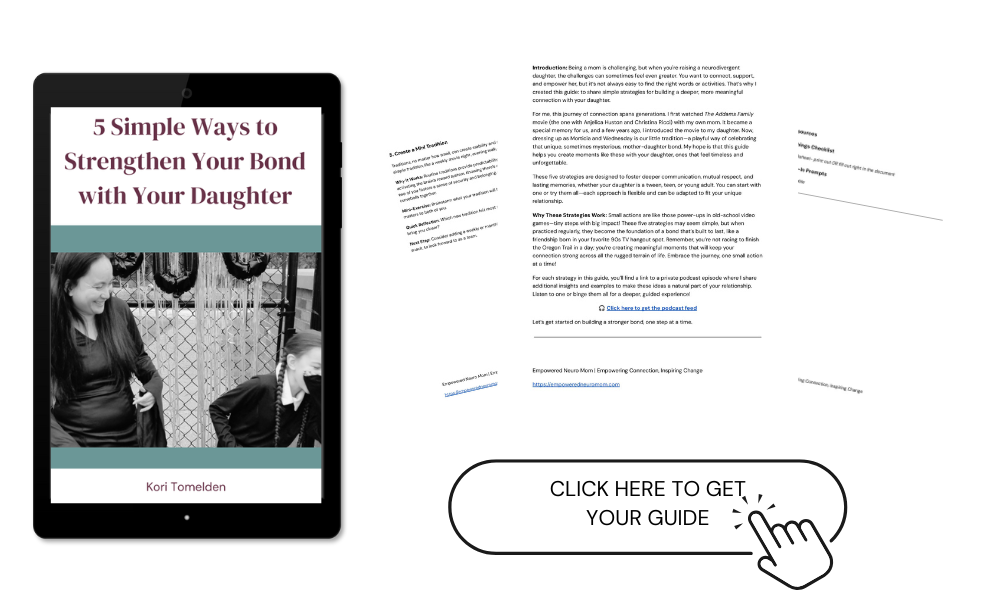Parenting can feel isolating, even more so when you’re a neurodivergent mom raising a neurodivergent child. While your peers may empathize with general parenting struggles, the nuances of your experiences—sensory overwhelm, executive dysfunction, or navigating meltdowns—often set you apart.
But here’s the thing: you don’t have to do it alone. Finding and connecting with other neurodivergent parents can be a game-changer. These are the people who will truly understand your journey, celebrate your wins (no matter how small), and support you through the hard days.
Let’s explore how to build a community of like-minded parents who can walk this path with you.
Step 1: Start with Your Existing Network
You might already know other neurodivergent parents without realizing it. Start by being open about your own experiences—it’s amazing how vulnerability can invite others to share their stories.
I remember casually mentioning to a fellow mom at a school event that I sometimes feel overwhelmed by the chaos of drop-off routines. Her response? “Me too—and I’ve learned to pack headphones in my bag for days when it’s too much.” That simple exchange revealed a shared neurodivergent experience and sparked a deeper connection.
Actionable Tip: Begin by sharing small, relatable aspects of your journey in safe spaces. Phrases like, “I’ve found [X strategy] helpful for my sensory needs—how do you handle it?” can open the door to meaningful conversations.
Step 2: Join Neurodivergent-Friendly Communities
Online communities can be a lifeline for neurodivergent parents seeking connection. Look for groups specifically geared toward neurodivergent moms or families. These spaces often provide not only support but also practical advice from people who “get it.”
When I joined a Facebook group for neurodivergent parents, I finally found a place where I didn’t have to explain or justify my experiences. Whether it was sharing tips for managing overwhelm or commiserating over sleepless nights, these connections became a vital source of encouragement.
Actionable Tip: Explore platforms like Facebook, Reddit, or Mighty Networks to find groups focused on neurodivergent parenting. Be selective—choose communities that feel positive, inclusive, and aligned with your values.
Step 3: Seek Local Meetups and Events
While online connections are invaluable, in-person relationships bring a different kind of depth. Many communities have local support groups or meetups for parents of neurodivergent kids. These gatherings offer a chance to share experiences face-to-face and build lasting friendships.
I’ll never forget attending my first local meetup. I was nervous, unsure if I’d fit in. But within minutes, I realized these parents were just like me—navigating the same challenges, celebrating the same victories. It felt like coming home.
Actionable Tip: Search for meetups in your area through websites like Meetup.com, local parenting groups, or your child’s school or therapy center.
Step 4: Create Your Own Community
If you can’t find a group that resonates with you, why not start your own? It doesn’t have to be complicated—a simple coffee gathering or virtual hangout can be enough to bring like-minded parents together.
When I couldn’t find a group tailored to my specific needs, I decided to start a small weekly coffee chat for moms navigating neurodivergent parenting. It began with just three of us and grew into a tight-knit community that supported each other through thick and thin.
Actionable Tip: Start small. Invite one or two parents you know to join a casual meetup. From there, let it grow organically based on shared interests and needs.
Step 5: Lean into Authenticity
Building connections requires authenticity. You don’t have to present a polished, picture-perfect version of yourself—just be real. Share your challenges, your triumphs, and even your messy moments.
In one of my parenting groups, I once shared a story about a particularly chaotic morning where I forgot to pack my daughter’s lunch and had to drive back home to grab it. Instead of judgment, I received an outpouring of similar stories that reminded me I wasn’t alone.
Actionable Tip: When sharing your experiences, focus on relatability. Authenticity is the bridge that connects us to others.
Step 6: Nurture Your Relationships
Finding your tribe is just the beginning—maintaining those connections takes effort. Check in regularly, celebrate each other’s wins, and be there during tough times. These relationships can become some of the most valuable anchors in your parenting journey.
I make it a point to send a quick text or voice message to a friend from my parenting group every week, just to say, “Thinking of you!” It’s a small gesture that goes a long way in keeping our bond strong.
Actionable Tip: Schedule regular check-ins with your community, whether it’s a monthly virtual meetup or a standing coffee date.
Conclusion:
Finding and connecting with other neurodivergent parents can transform the way you experience parenting. It’s not just about shared advice or resources—it’s about knowing you’re not alone, that others see you, understand you, and are walking alongside you.
If you’re looking for more ways to strengthen connections in your life, start with my free guide, “5 Simple Ways to Strengthen Your Bond with Your Daughter.” Building relationships starts at home—and it’s the foundation for everything else.



Comments